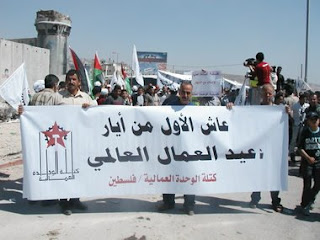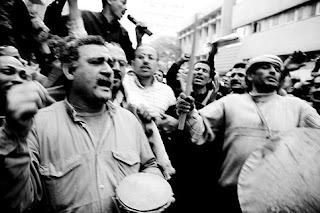



Israeli company tells Tel Aviv labour court that compensation claims of enemy workers from Gaza must not be heard in court
In December 2008, Sawt el-Amel filed compensation claims on behalf of 13 workers from Gaza who used to work in the former Israeli-controlled Erez industrial zone. Since then, hundreds of men and women from Gaza who before closure and disengagement used to work in Erez, in the Israeli settlements in Gaza, and inside Israel have contacted Sawt el-Amel with their claims for labour and social-security rights. The question of Gazan workers who lost their jobs and social security rights due to the hermetic closure of the Gaza Strip in 2004 has gigantic economic dimensions: compensation claims for the first 13 workers amount to almost 1.5 million shekels (USD 365,000) of minimum-wage claims, severance pay and other social benefits.
In light of these enormous amounts, Israeli employers fear that the pending cases could set a precedent. A letter sent by the company in question to the labour court in Tel Aviv exemplifies this fear, using the single most striking argument: granting rights to Gazan workers promotes terror.
The letter, dated April 19, 2009, neglects legal arguments for the sake of political ones. Calling on the court to delete the cases, the companys lawyers present the presiding judge with the following scenario:
The claimants are residents of Gaza, which is ruled by a terror organisation. This organisation Hamas is at war with Israel and does not recognise its right to exist. The fact that Hamas is still in power means that all residents of Gaza agree with its ideology, and therefore, all people in Gaza are enemies of Israel. Thus, it is beyond chutzpah (boldness) that residents of Gaza would demand to appear before an Israeli court, and accordingly the Israeli legal system must not open its doors to them. Moreover, the company argues, hearing the cases of Gazan workers would undermine the efforts by the National Security Committee to uphold the economic blockade of Gaza. For if the workers won their cases, financial resources would flow into Gaza, an enemy entity. In conclusion, preventing workers from Gaza from claiming compensation would help Israel to crush Hamas and to liberate the Israeli soldier Gilad Shalit who is being held captive by Hamas. Therefore, the company calls on the labour court as an organ of the Israeli state to behave in the interest of the state. (1)
Sawt el-Amel is taken aback by the interpretation offered by the companys lawyers, as, while it may reflect popular sentiments prevailing in Israel, it offers little legal substance. Moreover, and more importantly, it is questionable to suggest that a states legal system should act in accordance with political ends.
In this context, it should be noted that the labour court has already agreed to suspend the court fees of seven of the 13 workers because they provided evidence that they are unable to pay. The court accepted proof of the workers economic dependence on aid from UNRWA.
In contrast to the employers assessment of the situation, Sawt el-Amel maintains that workers rights are unalienable and that economic suffocation is a cause of violence rather than a remedy. Sawt el-Amels lawyers are currently preparing a reply to be submitted to the Court.
Example: The case of Mr. Ehab Abu Tayyieh, Gaza
Mr. Ehab Abu Tayyieh used to work as a carpenter for an Israeli company in Erez from June 1999 to July 2005. He worked six days a week for 10 hours per day and received 1,488 shekels per month (Israeli national minimum wage in 2005: 3,200 shekels).
Sawt el-Amels lawyers investigated his case and filed a claim in the Tel Aviv labour court requesting 219,000 shekels (USD 54,000) compensation from his former employer. The sum corresponds to the amount he is entitled to according to Israeli labour standards, including minimum wage, overtime, holiday and severance pay.
Today, Mr. Abu Tayyieh and his family are dependent on humanitarian aid from UNRWA, and the Israeli company he worked for exports its products all over the world and appears to be in excellent financial shape.
(1) The paragraph paraphrases the arguments presented to the court in the companys letter dated April 19, 2